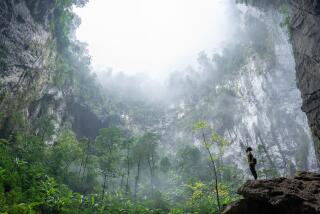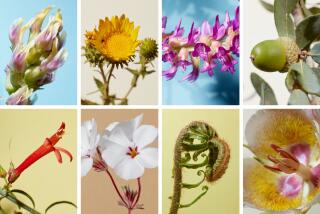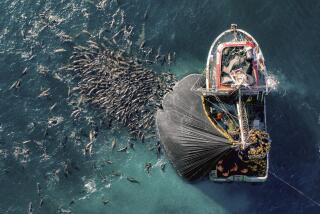Focus : ‘They Will Never Look at Plants the Same Way Again’
- Share via
NEW YORK — Let “Hard Copy” and all its brethren handle the private lives of the rich and famous. For those interested in the heartier stuff of the Earth, there is David Attenborough’s “The Private Life of Plants,” a six-hour series airing Monday and Tuesday on TBS.
Attenborough, television’s premier naturalist (and a knighted one, to boot) acknowledges that spending six hours with, well, a bunch of greens, may not seem immediately visual. “If I ran a network and someone gave me this idea, I’d say, ‘Why not just do a documentary on paint drying?’ ” noted Attenborough wryly on a recent visit to New York. “Fortunately, after 40 years of doing these things, I have some kind of reputation. So all they said was, ‘Are you absolutely sure?”’
He became even more certain of the power of the idea when his crew was able to use the latest advances in high-tech video and computer animation, enabling the viewer to get up close and personal with the tiniest of insects inside the tiniest of plant life. In addition, there is groundbreaking time-lapse photography able to convert days, months and years into seconds. “You couldn’t do this if you were a mere human being,” is how the naturalist puts it.
There was also good old-fashioned hard work, and using what Attenborough calls “intelligence units among local tribes.” For example, it’s those kinds of folks who could alert him when a 9-feet-tall plant called Amorphophallus titanum chose its three days (per three years) to come into bloom in the depths of the Sumatran jungle.
Americans may be surprised how exciting and beautiful scenes like that momentous event can be, not to mention squirting cucumbers “exploding at the slightest touch.” Viewers in England already have been surprised and excited since the series--produced by the BBC--premiered there in January.
“I think the reason it had such an impact is people are seeing things the human eye has never seen before,” says Attenborough. “If you were a man from Mars and came here for a visit, you’d say, ‘These green things are the amazing organisms. They survive longer than many animals, they can travel through time the way no animal can, they tolerate more conditions. And how many of us are aware of the seductions of wasps by orchids, let alone witnesses?”
Attenborough, who spent three years on the project, divides his story into various parts, proving how multifaceted these seemingly simple forms of life are: “They have to make food, get on with their neighbors, care for their young, find mates,” he points out.
The series literally took Attenborough, his crew, and expert guides to every continent, including chasing something called the “bird cage plant” He says he never faced any danger from the plants or animals themselves: “My only danger came in moments of being silly, like feeling I had to hang from a rope to better view the activity in the rain forest.”
His hope is that American audiences will respond the way the English have to the series. “Many people have told me they will never look at plants the same way again,” he says, “as something merely to be woven into a nest or picked. The truth is, they exploit us as much as we exploit them. We’re their servants, not their masters.
“I’m not going to tell you plants understand what we say, but they do behave, they have requirements and activities. Frankly, the most important thing is to get people to look in the first place. But I dare say that after the first two minutes, I think they will be sitting up in their chairs.”
“The Private Life of Plants” airs Monday and Tuesday at 5:05 p.m. on TBS (three parts each night).
More to Read
The complete guide to home viewing
Get Screen Gab for everything about the TV shows and streaming movies everyone’s talking about.
You may occasionally receive promotional content from the Los Angeles Times.






